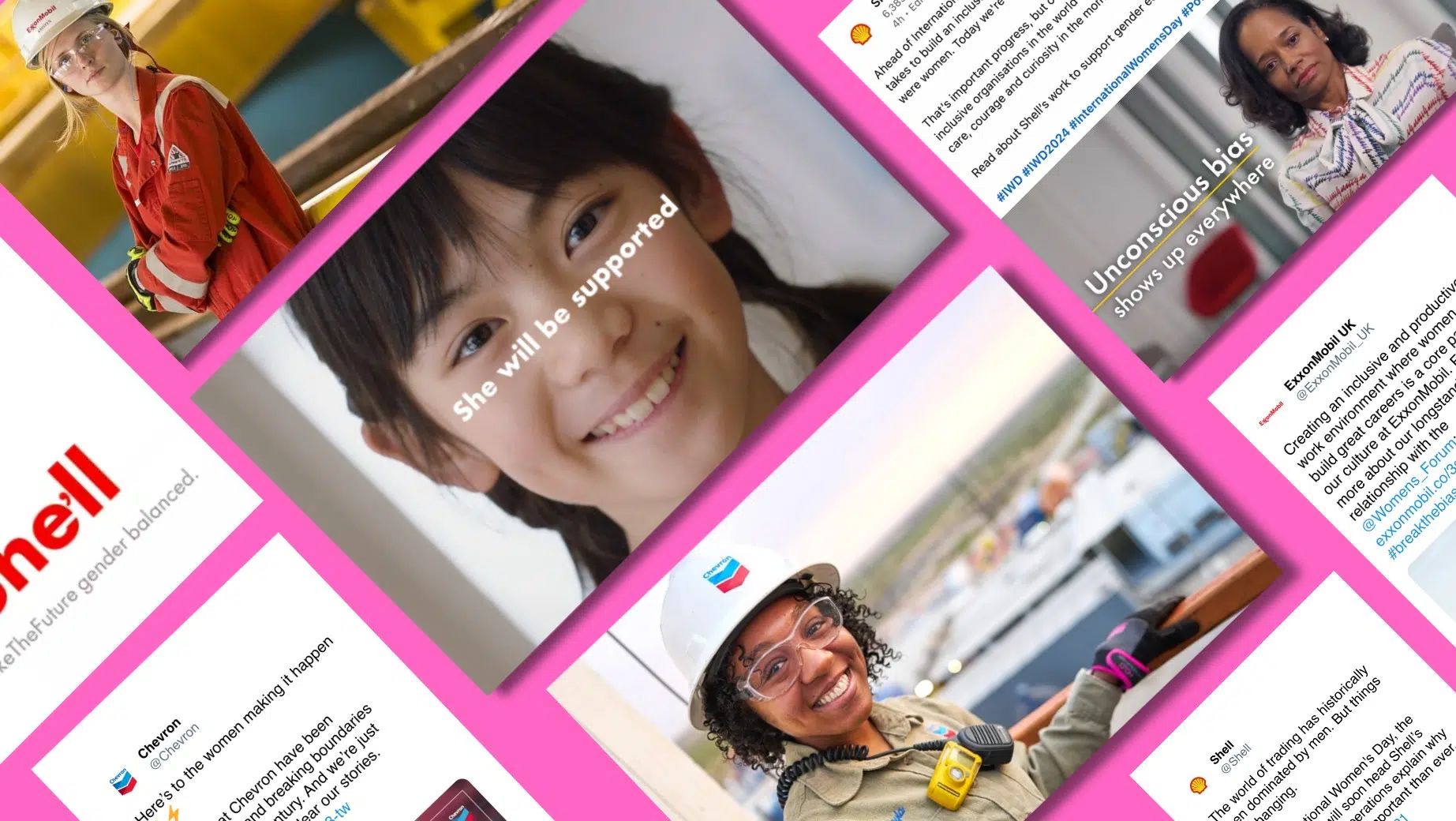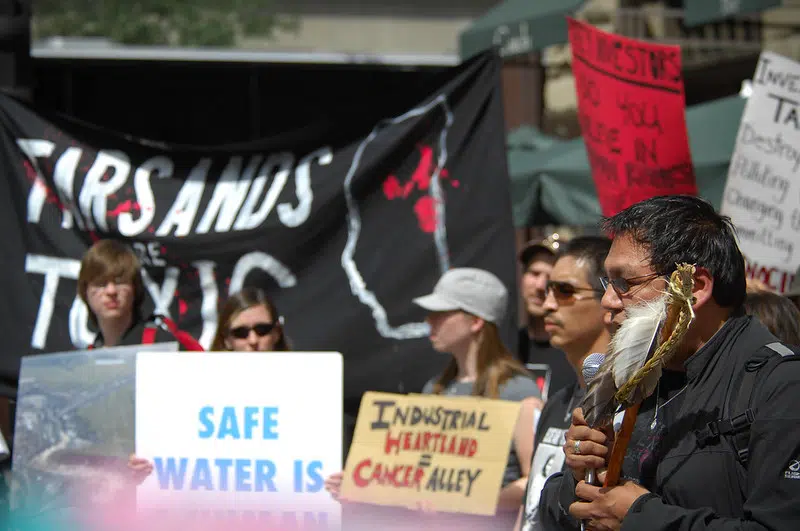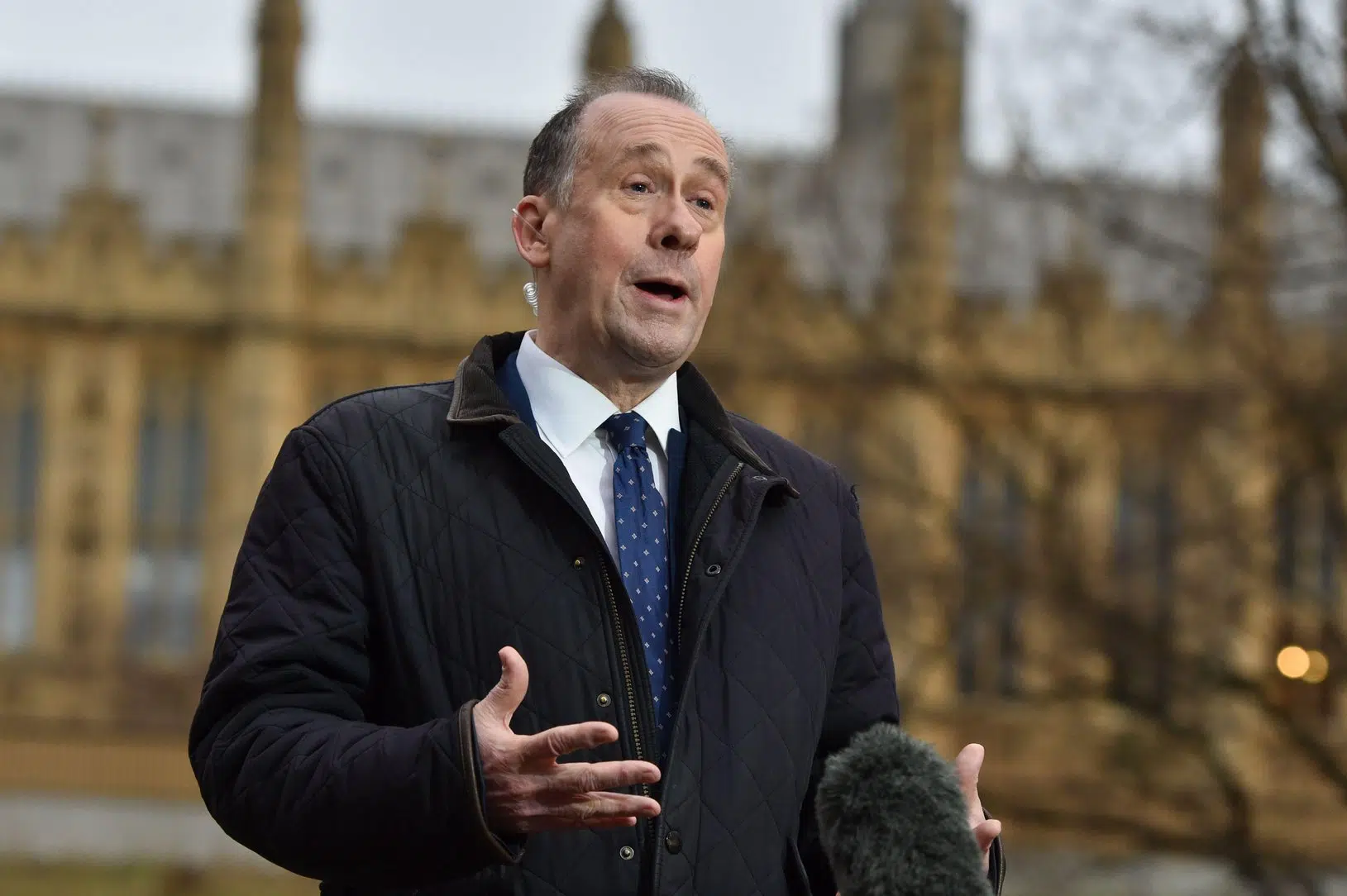
Message From the Editor
March 8 marked International Women’s Day (IWD), a day of global recognition of women’s many achievements and their long and ongoing fight for equal rights and fair treatment around the world. The day also marks an annual trotting out of glib #Girlboss-style ads from corporations trying to burnish their social capital. Shocker, the oil and gas industry is no exception.
As an excellent DeSmog team of female journalists wrote this week, “Even in a sea of tokenistic stunts by brands on the sole day devoted to the women’s movement, the PR and advertising tactics of oil and gas companies stand out, not only for their hollow gestures but the absurdist slogans they employ.”
Such social media #hashtivism rings particularly hollow when you realize the many ways that the climate crisis disproportionately affects women and girls, especially when climate change collides with endemic sex discrimination.
Ad and PR giants like WPP and their subsidiaries enable companies like Shell, ExxonMobil, and other fossil fuel firms to create slick girl-power narratives for a sector renowned for its low female employment.
After a decade with Shell, Caroline Dennett was fed up with it all. In 2022, the Shell safety consultant loudly quit her job over the company’s inaction on climate change.
“They do not value human life, or any other form of life on the planet,” Dennett told DeSmog. “They only care about drilling and making money.”
Keep that in mind as you hear other fossil fuel industry slogans about “responsible gas” or “certified gas” that promises low pollution, but as one former Texas regulator told DeSmog, “That’s literally greenwashing and marketing.” Dive into the growing trend of so-called “certified gas” and the U.S. utilities passing on the extra cost to ratepayers.
Have a story tip or feedback? Get in touch: [email protected]. Want to know what our UK team is up to? Sign up for our UK newsletter.
Thanks,
Brendan DeMelle
Executive Director
P.S. This week, the UK energy efficiency minister praised a DeSmog investigation uncovering “false and misleading stories” from the gas boiler industry. Readers like you make this work possible. Can you donate $10 or $20 right now to support more of this essential work?
Image credit: Ellen Ormesher.
Utilities Are Buying Pricier ‘Responsible Gas.’ But for What Climate Benefit?
— By Nick Cunningham (10 min) —
Virginia Natural Gas’s aim, as it wrote in its request to the state regulator, was to “further support the reduction of greenhouse gas emissions.” As part of its “Sustainable Gas Program,” the Virginia-based private utility wanted to purchase what it calls “Next Generation Natural Gas.” But it needed the state’s blessing in order to pass on to customers a 15 percent premium for buying this specially certified gas.
The utility received that approval — but only for a five percent premium — in November 2022. Less than six months later, Virginia Natural Gas boasted that it was supplying “NextGen Gas,” or gas “produced with lower greenhouse gas emissions,” to satisfy up to half of the energy demands of its 300,000 customers. Whether that added expense and certification actually deliver on their climate promises, however, remains unclear.
Oil and Gas Companies Want You to Think They Care About Women — but It’s Just PR
— By Ellen Ormesher, Emily Gertz, Kathryn Clare and Cartie Werthman (4 min. read) —
In a March 7 video posted to Shell’s LinkedIn page, a woman named Kimberly says to the camera, “Unconscious bias shows up everywhere, in all forms, and it is more prevalent than any of us would like to admit.”
In the supercut of Shell employee testimonials that follow, a woman named Jane declares that “still too often, women are expected to be grateful for the opportunity to prove themselves,” and a man named Kevin admits that “when you’re part of the majority, a lot of the time you overlook it.”
First Nation Sues Alberta Energy Regulator Over Kearl Tailings Pond Spill
— By Taylor Noakes (6 min. read) —
A northern Alberta Indigenous community is suing the Alberta Energy Regulator for the effects of an ongoing environmental disaster at an Imperial Oil tar sands mine.
Athabasca Chipewyan First Nation (ACFN) Chief Allan Adam served the CEO of the Alberta Energy Regulator (AER) with a statement of claim indicating his community intends to hold the regulator legally responsible for the aftereffects of the Kearl mine disaster that began in 2022. Chief Adam hand delivered the lawsuit to CEO Laurie Pushor during an AER townhall meeting in Fort Chipewyan on Tuesday March 5.
Wood Pellet Giant Drax Targets California Forests
— By Phoebe Cooke (7 min. read) —
Plans by biomass giant Drax to manufacture wood pellets sourced from Californian forests will endanger natural habitats and increase toxic air pollution for rural communities, campaigners warn.
The British energy company has partnered with Golden State Natural Resources, a government-linked nonprofit which plans to build two industrial plants in rural California counties that would produce one million tonnes of compressed wood fiber pellets a year.
UK Government Holds its Nerve on Heat Pumps as Clean Heat Policy Confirmed
— By Phoebe Cooke (5 min. read) —
A cornerstone of the UK’s plans to slash the use of gas in home heating has survived a bitter backlash from the gas boiler sector.
Speaking in the House of Lords yesterday, energy efficiency minister Martin Callanan brought an end to months of speculation when he announced that a plan to ramp up heat pump installation targets would go ahead on April 1, despite intense lobbying.
From the Advertising & Public Relations Database: WPP
WPP, based in London, is the world’s largest advertising holding company by revenue. Through its numerous subsidiaries, including VML and Ogilvy, WPP has worked for fossil fuel clients including Saudi Aramco, Shell, BP, and TotalEnergies. The company pledged to reach net-zero emissions from its direct operations by 2025, and across its supply chain by 2030. WPP had 55 contracts with fossil fuel clients across 2022 and 2023, more than any of the other five major holding companies in the advertising industry, according to a report by Clean Creatives. Group SJR, a WPP subsidiary, ran the ExxonMobil website energyfactor.exxonmobil .com, which sought to “highlight ExxonMobil’s commitment to innovation, research, and emissions-reducing technologies.” The site was aimed at least in part at “skeptics of the brand” to show that the energy industry is “developing safe and reliable energy sources not only for today, but for the future, while also mitigating the risks of climate change,” Group SJR wrote in an award application for the PR campaign.
Read the full profile and browse other individuals and organizations in our Ad & PR Database, Climate Disinformation Database, and Koch Network Database.






